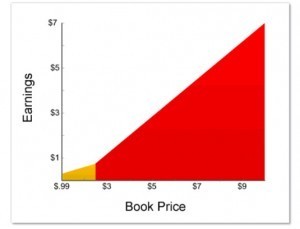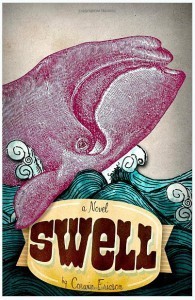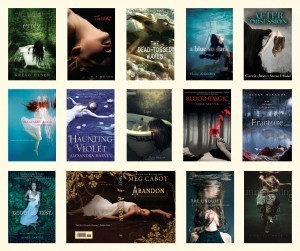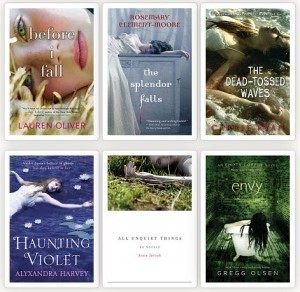Writing on the Ether

iStockphoto / CharlieBishop
Is that a nest you're sitting on?
Library ebooks: If it walks like a Penguin …
Self-Publishing Babylon: And talking peace in the valley
A Swell new book: And how to handle criticism
Ethics in fiction: Beautiful dead girls
Extra Ether: Good stuff
Is that a nest you're sitting on?
So crikey. Just when you think you have it all worked out—the difference in mammals and publishers—you look up or down or somewhere and find a big surprise. Right under you. Can a Big Six publisher really lay one of those?
Here we are, having our pre-Thanksgiving picnic on the hillside of publishing. Surveying the battle below. We kibitz a little, as some of our most self-congratulatory DIY authors fight The Bird That Walks Upright Like Us. Over the territory called Book Country. We're actually going to hear from a peacemaker on that one–there could be another bird on the scene, one called a dove.
But first, boom! Followed by the pitter-patter of little flippers on linoleum. Look! Over at your library! It's a bunch of short guys in tuxedos running away with the ebooks!
The publishing industry makes pilgrims look like sensible dressers.
While you're bent over double trying to buckle on thine shoes, we're dodging another big bird, The One Who Gobbles. We're gassing out the Ether a day early this week—the effluvium usually gathers here on Thursdays. By super-heating our airy bower, we hope to better enjoy the Cornucopia of Uproars with which our pioneers in digitalia have roiled themselves of late.
Then we'll explore something Swell in book criticism. And we'll call into question that dubious genre, Beautiful Dead Girls.
Going forward—and have we ever gone backward? don't answer that—I'll add an update or two to the Extra Ether section below and tweet it madly, as is my wont, so you might find a fresh whiff or two here, even while hunkered for the holidays. Honk if you have pumpkin pie.
Allora. To the barricades, or to the dogs, whichever comes first.
And my best wishes for the special displays of gluttony with which we annually demonstrate our collective gratitude.
#bbpBox_132170965714087936 a { text-decoration:none; color:#1F98C7; }#bbpBox_132170965714087936 a:hover { text-decoration:underline; }I don't care how organized and sane you make it sound, I am NEVER hosting Thanksgiving dinner without a lobotomy: http://t.co/dp07jJGB[image error]November 3, 2011 2:03 pm via web Reply Retweet Favorite Ginger Clark
Library ebooks: If it walks like a Penguin …
Last week Penguin sent notice to OverDrive that it is reviewing terms for library lending of their eBooks. In the interim, OverDrive was instructed to suspend availability of new Penguin eBook titles from our library catalog and disable "Get for Kindle" functionality for all Penguin eBooks.
That's how Laura Hazard Owen at PaidContent quoted OverDrive, the main distributor of books to libraries. OverDrive's homepage makes it clear just how vested they are in "ebooks from your library, everywhere and anywhere."
But with that posting on OverDrive's site, a not-so-funny thing had happened to library patrons on the way to Thanksgiving.
At The Digital Shift, a site that's focused "on libraries and new media," Michael Kelley posted Penguin Group USA to No Longer Allow Library Lending of New Ebook Titles and updated with a quote from Penguin Group (USA) media relations manager Erica Glass with a bit more:
Penguin has been a long-time supporter of libraries with both physical and digital editions of our books. We have always placed a high value on the role that libraries can play in connecting our authors with our readers. However, due to new concerns about the security of our digital editions, we find it necessary to delay the availability of our new titles in the digital format while we resolve these concerns with our business partners. Penguin's aim is to always connect writers and readers, and with that goal in mind, we remain committed to working closely with our business partners and the library community to forge a distribution model that is secure and viable.
In a phrase, the community at large isn't entirely buying it.
#bbpBox_138996633445732352 a { text-decoration:none; color:#706238; }#bbpBox_138996633445732352 a:hover { text-decoration:underline; }Hey @about 20 hours ago via TweetDeck Reply Retweet Favorite Don Linn
Michael Cader at Publishers Marketplace (which requires a very worthwhile subscription) was the first to raise the specter of Amazon in Penguin Cancels Kindle Library Lending, For Now–Will Others Follow?
Though OverDrive had promised in April that (library) patrons' "confidential information will be protected," in implementation their program is an engine for turning library users into Amazon customers… they send patrons directly to Amazon's site for processing. Some publishers believe this violates their contracts with both OverDrive and Amazon.
#bbpBox_139029891701145601 a { text-decoration:none; color:#0084B4; }#bbpBox_139029891701145601 a:hover { text-decoration:underline; }@about 18 hours ago via HootSuite Reply Retweet Favorite Ron Charles
Owen shows you the very-Amazon page you land on to get your ebook in her follow-up post, Why Might A Publisher Pull Its E-Books From Libraries?
Notice anything? Yeah, it looks an awful lot like an Amazon shopping page and I have to be logged into my Amazon account to get the book… The NYPL's Christopher Platt recently told Publishing Trends that since Kindle added library lending, "Our average new patron registrations have more than doubled from 80 a day to 172 a day. Average daily e-book checkouts increased from 1,161 to 1,511 [23.2%]. Kindle downloads account for 33% of that use" (Kimberly Lew, Publishing Trends, November 2011).
Two more potential motivations for Penguin's withdrawal of library books from the system are included in Owen's observations: Perhaps "Penguin thinks people are checking out e-books from non-local libraries" and maybe "Penguin is worried that e-book checkouts from libraries will cut into sales."
None is fully convincing, however, at least not to the Tweet Chorus of publishing observers who have gathered in holy semicircle to tear a little hair and gnash a few teeth.
#bbpBox_139007755938824192 a { text-decoration:none; color:#088253; }#bbpBox_139007755938824192 a:hover { text-decoration:underline; }@about 19 hours ago via Twitter for Mac Reply Retweet Favorite Kassia Krozser
Like an early thespian's nightmare in which Euripides and his lead actors all nip off for baklava at intermission, the main voice is missing. Neither Glass nor anyone else from Penguin, as of this writing, seems to feel she or he can engage in the debate.
Once more, as I've mentioned in earlier vapors here, our large best-established houses seem to be somewhat PR-deaf and unable to understand the importance of communicating with those most important of all folks, the customers.
#bbpBox_139024636125003776 a { text-decoration:none; color:#0084B4; }#bbpBox_139024636125003776 a:hover { text-decoration:underline; }I predict in 5 years (1) major publishers will sell frontlist to libraries on a per-read basis; (2) per-read fees will be 40-70% retail.[image error]about 18 hours ago via web Reply Retweet Favorite Tim Spalding
I'll leave you for now with Michael Kelley, again, in a new post, Librarians Face Patrons Unhappy With Penguin Policy Change; ALA Condemns Ebook Decision. Noting that Penguin's decision "has left librarians once again facing patron gripes," he quotes American Library Association president-elect Maureen Sullivan doing a far better job of stating the public's and customers' interest than the black-and-white fowl is doing for itself:
If Penguin has an issue with Amazon, we ask that they deal with Amazon directly and not hold libraries hostage to a conflict of business models. This situation is one more log thrown onto the fire of libraries' abilities to provide access to books – in this case titles they've already purchased. Penguin should restore access for library patrons now.
#bbpBox_139104485585858560 a { text-decoration:none; color:#FF3300; }#bbpBox_139104485585858560 a:hover { text-decoration:underline; }With five of the "Big Six" not playing nice with libraries on ebooks, which smaller publishers are poised to fill the void? #dbw[image error]about 13 hours ago via HootSuite Reply Retweet Favorite Guy L. Gonzalez
Self-Publishing Babylon: And talking peace in the valley
A new program from Penguin that made me throw up in my mouth when I read about it… Book Country, which debuted in April as a place for authors to post their work for critique, recently announced a program to turn manuscripts posted on their website into ebooks and paper books…I'm blogging about this to warn newbie authors NOT to use Book Country. This blog gets more traffic than Book Country does, so hopefully anyone looking for "Book Country" on search engines will find this post and learn what a Very Bad Idea it is to use Book Country's services.
Yes, it's the same bird again. Penguin. And it's Joe Konrath. With characteristic zest, he goes on:
What is Book Country doing for you that entitles them to 30% royalties? Especially if/when you pay for the formatting?… I've sold 500,000 ebooks. If I'd published with Book Country, they would have taken $290,000 in royalties from me. That's just awful.

Book Country Pricing & Earnings November 2011 / BookCountry.com
Well, since we don't have a direct answer to Konrath's "what have they done for you lately?" question, I'll offer you the Book Country site's Publish Your Book pages.
And here is, specifically, Pricing & Earnings, in which the afore-disdained 30 percent figure is mentioned.
I'm even adding Book Country's chart, no extra charge.
As a matter of Ethereal housekeeping, may I point out that the proper Twitter handle for Book Country is @Book_Country? Note the underline between "Book" and "Country," hearth and home.
Someone identified by Twitter as a Mr. John Helling has, I fear, found himself the subject of a great deal of misdirected agitation.
#bbpBox_138658856258633728 a { text-decoration:none; color:#b83c16; }#bbpBox_138658856258633728 a:hover { text-decoration:underline; }No matter what your feelings about Book Country may be, tweeting them angrily at @November 21, 2011 11:43 am via HootSuite Reply Retweet Favorite Book Country
In this instance of barely collegial debate, there has been more response, I'm glad to say, from the penguinery. Nothing directly addressing the royalty issue as Konrath and others have energetically raised it. But in response to PaidContent's questions, we do have this from Penguin on the second page of Owen's initial write, Self-Published Authors Sharply Criticize Penguin's Book Country .
As for the sales transactions after a book has been published, like many sites, Book Country takes a percentage of each sale of a book. When we distribute your book out to other sites, the third party sites also take a percentage. This is not unusual. This is how many new publishing operations function. In contrast to traditional publishing houses, Book Country offers the author a much higher percentage since Book Country is not incurring editorial, marketing or publicity costs. Book Country is incurring costs to code the professional ePub file, set-up the print file for printing, distribute the book files and the metadata out to all retailers, account for incoming sales in multiple channels, and pay out to authors on a monthly basis. Not to mention the cost of maintaining the Book Country site and all of the tools, like the Genre Map, that are meant to help authors actually find paying readers, very valuable benefits. Book Country can make your book available everywhere that ebooks are sold.*
*Except maybe to libraries? Sorry, I don't know what came over me.
None of this mollifies some who have gone to the megaphones to condemn Book Country's offer.
#bbpBox_138627844745080834 a { text-decoration:none; color:#1F98C7; }#bbpBox_138627844745080834 a:hover { text-decoration:underline; }Way too much negativity, innovation is crucial, @November 21, 2011 9:40 am via web Reply Retweet Favorite David Nussbaum
Oh, the New Vanity (of Penguin & Book Country), writes Will Entrekin. "In general, the only thing worse than 'self-publishing,'" he writes, "at least in the eyes of corporations and those associated with them, is 'vanity publishing.' Paying to make your book."
Penguin Launches Rip-Off Self-Publishing "Service" Targeting Inexperienced Writers, writes David Gaughran. He decries:
"The wall-to-wall, uncritical coverage from the likes of eBookNewser, Publishers Weekly, and the Wall Street Journal… Here's the opener from yet another Book Country puff-piece – this time from the UK broadsheet, The Guardian (by Allison Flood): "Want to be published by Penguin, the historic press which is home to authors including Roald Dahl, Beatrix Potter and Kathryn Stockett? Now you can be – and for as little as $99 (£60), as Penguin's American arm announced a move into self-publishing."
Something Else Penguin/Book Country Should Be Ashamed Of is at the blog-stead of David P. Vanagriff, the artist formerly known as Passive Guy. Here, we find JW Manus holding forth with a boisterous comments section—into which dropped Colleen Lindsay, Book Country Community Manager, to clarify points of the Terms of Use.
#bbpBox_138626336611774465 a { text-decoration:none; color:#0099B9; }#bbpBox_138626336611774465 a:hover { text-decoration:underline; }@November 21, 2011 9:34 am via Seesmic twhirl Reply Retweet Favorite Sarah Weinman
Agree or disagree with Book Country's Lindsay, at least someone at Penguin did engage in the discussion this time, something I wish the corporate parties felt they could do more frequently. Here is a bit of Lindsay on whether the rights to work entered into the Book Country community are encumbered.
In short: No, your rights are in no way encumbered by Book Country if you choose to post a portion to the community for workshopping services. Period. You also own the copyright to all the fiction you publish to the site. Period. The long legal answer: We worked with a large group of agents and editors (and not only Penguin editors) when we put together the Terms of Use. We also confirmed with all of them that they would not consider a writer's work to have been "published" if the writer were to upload a portion of that work to a community site for the purposes of workshopping and getting critiques.
Of course, before the marshmallows are on the sweet potatoes, we've heard back from Manus in My Answer to Colleen Lindsay the Book Country Community Manager: "What I really don't expect is for legitimate publishers to join the ranks of scammers, con artists and outright crooks in fleecing overly hopeful and desperate writers."
#bbpBox_138655750712070145 a { text-decoration:none; color:#0084B4; }#bbpBox_138655750712070145 a:hover { text-decoration:underline; }@November 21, 2011 11:31 am via Twitter for iPhone Reply Retweet Favorite Matt Mullin
Basta. In calling a truce long enough to get to the next item, I'm turning to Mick Rooney of Dublin, at the Independent Publishing Magazine.
"I've a mixed opinion on this," Rooney writes, immediately winning me over. (You mean everything isn't black and white?)
I'm going to quote Rooney at some length from his Book Country – For or Against Self-Publishing? For an Irishman, he sounds like he knows a thing or two about the American concept of Thanksgiving.
Konrath, Gaughran, Hoffelder, Linda Welch, Katie Salidas, Manus, Entrekin, yea, and Penguin's newly promoted (congratulations) Molly Barton and Lindsay, Dasher and Dancer, as well: Hold your fire. And have a look.
For so long the self-publishing community has fought for acceptance and recognition within the publishing industry. Just when we have eroded some of the stigmas, and proven that some self-published authors and their books can compete at the forefront of publishing, it would be a shame to start to show a divided front in self-publishing. I understand Joe Konrath's ire because he came from a foundation within traditional publishing, did an about turn, and embraced the changes and benefits for the author as an individual business concern by self-publishing. So, I can understand him having a pop at one of the Big Six when they 'cream' it off the little guy. I'm just offput by Joe's 'Harry Enfield's Loads a Money' approach to highlighting his success, and that that should be the underlying perception of self-publishing to new authors entering the precarious field of self-publishing. Because the reality of self-publishing is far from the world of Konrath.
One of the greatest strengths of self-publishing over the past few years has been its adaptability, using online communities to celebrate, disseminate and promote books, as well as passing experience on, author to author. Crucially, it's no substitute for connecting with readers, unless all your readers are authors themselves! Readers congregate on forums like Amazon and Goodreads – hybrids of publishing/sales platforms. The biggest challenge for the self-publishing community is to stretch beyond selling books to its own community, and it's important we are as critical of ourselves as we are so openly to criticize the broader publishing industry.
Divided we fall – united we conquer.
#bbpBox_139260404550483968 a { text-decoration:none; color:#0066CC; }#bbpBox_139260404550483968 a:hover { text-decoration:underline; }How our insane weather is ravaging our Thanksgiving dinner: http://t.co/OUMFj5GB /@about 2 hours ago via TweetDeck Reply Retweet Favorite Fast Company
A Swell new book: And how to handle criticism
"Towel," she said. "Orange, close your mouth, and go get me a towel." I wondered why I should take orders from this woman. She was as vulnerable as someone gets; she had been very mean to me; and she hadn't yet even said hello. So I fetched her a towel.

SWELL cover design for Dark Coast Press by Chris Jordan with Charlie Potter
In my review of Swell, the debut novel from author Corwin Ericson at Reader Unboxed this week, I had the happy chance to amplify that best of catches: a new, agile, rambunctiously intelligent voice. "Ericson has every reason to be proud of his knack for worldly wordplay," I wrote. "When he summons up the courage of that intelligence, he sings to his reader in chanteys of bunk-bed bunkum, flattering you with his assumption of your savvy."
Hm. That's sort of fun, quoting oneself.
"Such quick arcs of spin and recognition," quoth me, "are what make Swell swell, and they work when Ericson trusts you to keep up."
Now, as part of this critique, I knew I had to run the happy boat aground briefly and hash out some problems of production, "in this Moby on the way to .mobi." Among them, I wrote:
the opening two words of chapters are stuck together
there are repetitions of articles, as in this phrase (underline mine): "Korean Ill John, was wearing a a black nylon jacket"
curious gaps open in the text from time to time
one character's answer frequently is stuck in the same paragraph as another character's question.
And then, I heard back from the publisher, Aaron Talwar at Seattle's Dark Coast Press. Talwar has granted me to quote some of his e-mail to me about Swell:
I would like to let you know a little bit on what happened in the transition to the e-book edition. As a small publisher with a limited budget, we were "taken for a ride" on what happened with the final version of the electronic copy. We did not catch all of the mistakes that you so graciously pointed out but I we are hurriedly re-connecting with the people that made the electronic version to amend any and all of the mistakes at their cost. As for the standard of our editor and our team, I stand by our work and I know how much time went into making it as perfect as possible. Unfortunately, things were missed and they will be sure to also go into being fixed as well. It is not a standard we live by and I openly apologize to anyone whose reading experience was effected.
First, take a moment to appreciate what a big "small" publisher it takes to let me enumerate the flies in this ointment so gracefully. This is one of the most responsible, forthright, and cordial responses I've encountered to criticism, and I've been reviewing one poor victim or another since the 13th century or so.
Second, Talwar is right to mention the travails encountered by anyone, especially small houses on lean budgets, in outsourcing conversion work, the formatting it takes to "go digital," as all books must now go. It's probably too easy for many of us to forget this.
But in case it's of use in understanding what's happening, I'll give you a little insight into the massive online operation I was with for many years, CNN.com. There, our execs learned to have our developers sit with us on the newsroom floor and study what we did, as journalists, writers, editors, producers, anchors, correspondents, before even beginning to build a new CMS (content management system) for that vast site. We had discovered that our truly expert developers were not, predictably, editorialists.
And this is what we're seeing today. A company with the superb intentions of Talwar's Dark Coast Press, an author with the surface-breaking panache of Ericson, all your kingdom's horses and a few of the best women in computers anywhere still cannot overcome the fact that precious few technical folks have the editorial chops to truly know what's required to hit the mark of high-quality publishing.
Do I have an answer for you? No more than Ericson's Candide, one Orange Whippey, has a clue to how he's going to get home to his cat Rover tonight.
But I know that's what we're dealing with. Unless you can sit with your conversion people, as we sat with our CNN web virtuosi, and collaborate on turning this screw, we're going to see such intriguing talents as Ericson and such dedicated producers as Talwar slipping and sliding across bad patches of seaweed they didn't put on the beach, themselves.
We'll push off on a high tide, courtesy of Ericson.
It was subtle theater, each of us trying to outbore the other through shades of inaction, and I supposed I was a mere spear-carrier in the production. I locked my knees and pretended I was getting paid. That which doesn't kill me only makes me older.
#bbpBox_138705530842644480 a { text-decoration:none; color:#FF3300; }#bbpBox_138705530842644480 a:hover { text-decoration:underline; }Cordial author responses make my Grinch's heart swell. #Cheers[image error]November 21, 2011 2:49 pm via HootSuite Reply Retweet Favorite John M Cusick
Ethics in fiction: Beautiful dead girls
Dead girls in water, dead girls in bathtubs, dead girls in forests, dead girls in pretty dresses. Girls who might be dead, or might just look dead. Dead girls in so many pretty dresses…. Most of the images aren't blatantly violent or overtly sexual. It might be more appropriate to call them glamorized—they seem less the product of overt "male gaze," and more the product of teenage girls' morbidity. Rather than presenting the idea that violated and dominated women are sexy, these images present the idea that it is beautiful and dramatic and—as Poe would have argued—poetic to be dead.

From Rachel Stark's Trac-Changes blog
Rachel Stark in Cover Trends in YA Fiction: Why the Obsession with an Elegant Death? argues that "this book cover trend—and the larger obsession of teenage girls with the concept of beautiful death—is at least in part the product of internalized misogyny." Without leveling blame, Stark defines a trend in young people's literature that's anything but beautiful.
I admire Stark's courage and agree with her assessment, especially when I see female authors churning out undead romance peopled with women begging guys to bite them to death. When Bram Stoker wrote his 1897 kill-me-you-handsome-vampire shtick, we knew exactly who was victimizing whom. Sadly yes.
In Stark's compilation of covers, I see three men named as authors. I see twelve women. "Anecdata?" Maybe. Would I be wrong to assume that the majority of these YA works of the Beautiful Dead Girl genre are written by women?
Stark calls attention to another writer's shorter piece on the topic, the Californian teen services librarian Allison's A wee rant for Halloween: I see dead people. Allison's collection of covers adds three more female authors' names to the mix. Here's a little of what Allison writes:
I'm really tired of seeing books covers with dead-looking girls on them. It's kind of misogynistic, honestly. I mean, are there any covers out there with dead guys on them?… By no means do I intend to criticize the books with these covers, or their authors. These are some great reads! I know authors don't typically have input on their book covers, and to be fair, most of these books actually do feature females who have died, so it's not like their covers are totally off the mark. But just– isn't there anything else that could accurately represent plot elements from these books besides some poor girl's lifeless eyes staring out into space or limp, pale body flailing in an awkward position? It's, like, the opposite of empowering.

From Allison's Reading Everywhere blog
I'll say it before you can: What do I know? Rather than judge these authors by their covers, I'm asking. What do you think of Stark's and Allison's misgivings? Especially when it comes to women writing for young women, what is this Beautiful Dead Girl stuff?
We need not spend time here on the authors-have-no-control-over-book-covers fact of life. We all know that.
I'm more interested in the message that generates those covers, the message that these books convey to young readers.
I'd like to hear from writers in this genre. That's why Jane Friedman gave us the comments section below. You'll find me down there, being gnawed to pieces in the twilight by toothy self-publishing authors as I hand the stake back to Stark for the last word:
I don't fault YA publishers or the covers above for this trend. As I said, I see those covers and the demand from which they stem as the product of, not the force behind, internalized misogyny. But, looking at them as a reflection of teenage girls' psyches, I'm saddened by what I see and left feeling helpless in the face of forces that seem unstoppable. In the apt and succinct words of my good friend Jenny, "I know that we have to trust teenage girls to cope and persevere and come out of this fight kicking, but honestly I'd rather make all this shit go away." This time around, I pretty much agree.
#bbpBox_138344179473453056 a { text-decoration:none; color:#4b656b; }#bbpBox_138344179473453056 a:hover { text-decoration:underline; }I know I ought to cook for the Thanksgiving potluck I'm hitting up tonight, but I just want to nerd out about narrative structure some more.[image error]November 20, 2011 2:53 pm via web Reply Retweet Favorite Rachel Stark
Extra Ether: Good stuff
Fast facts about Thanksgiving Day, from the good folks at InfoDocket, grazie.
248 million: The number of turkeys expected to be raised in the United States in 2011. That's up 2 percent from the number raised during 2010. The turkeys produced in 2010 together weighed 7.11 billion pounds and were valued at $4.37 billion.
No word on the penguin population.
#bbpBox_139008400917934080 a { text-decoration:none; color:#0084B4; }#bbpBox_139008400917934080 a:hover { text-decoration:underline; }Whoever keeps calling me from a blocked number, yes, I am screening you. Leave a damn message already so I can not return it.[image error]about 19 hours ago via TweetDeck Reply Retweet Favorite Jeff Bercovici
Three Keys to Success: Show Up, Be Present, and Hope for Serendipity from Dan Blank.
As many of us celebrate Thanksgiving this week, I am considering…those who have made the effort to show up, to care. Those who push, who expand what is possible. Those who make me a better person simply by being present in my life.
Porter Anderson is a Fellow with the National Critics Institute, and a producer and consultant formerly with the United Nations World Food Programme in Rome and INDEX: Design to Improve Life in Copenhagen. As a journalist, he has worked with media including CNN, the Village Voice, and the Dallas Times Herald. He reviews literary fiction at Reader Unboxed, and is based in Tampa.
Jane Friedman
- Jane Friedman's profile
- 1882 followers




